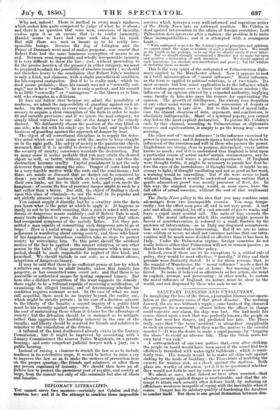DIPLOMACY LITERALIZED.
You cannot serve two masters—oertainly not Cobden and Pal- merston too : and it is the attempt to combine those impossible
services which betrays a very well-informed and ingenious writer of the Daily News into an awkward position. Mr. Cobden is dead against intervention in the affairs of foreign countries; Lord Palmerston does intervene after a fashion : the problem is to unite these incompatibilities; and it is attempted with a courageous heart— "With unfeigned respect for Mr. Cobden', general principles and opinions, we cannot admit the sense or wisdom of such a political view. We Would go his length so far, perhaps, as to say that we should rarely if ever inter- fere. But we should strongly recommend a Minister not to make too open
and positive a declaration of such intention We should approve of such intentions [as absolute non-interference and peace] ; but the wisdom of declaring them we doubt."
This is the very spirit of the antiquated or Pahnerstonian diplo- macy applied to the Manchester school. Now it appears to rest on a total misconception of "moral influence." Moral influence, as the term is applied to political relations, is of two kinds. Its most accurate but less usual application is to the influence which true wisdom possesses over a lesser but still honest wisdom ; the influence of an opinion uttered by a respected authority, implying some faculty in him who pays the respect for appreciating the opinion. The growth of intelligence, the victory over despotism or any other social wrong by the actual conversion of despots or their supporters, is very slow. But to this kind of moral influ- ence the utmost clearness of data, argument, and conclusions, is absolutely indispensable. Short of a spiritual popery, you cannot stop before the most explicit declaration. To pursue Mr. Cobden's ends by this channel, according to Palmerstonian or diplomatic reserves and equivocations, is simply to go the wrong way—never arriving.
The other sort of" moral influence" is the influence exercised by power in quiescence; and it depends upon a knowledge in those to be influenced of the resources and will in those who possess the power. Englishmen are strong, clear in purpose, determined : every nation knows as much; and if it is understood that England is bent upon a particular course of action under° certain circumstances, any fo- regn nation may well waive a practical experiment,. If England were thought feeble, it might be necessary to parade her fleet be- fore the eyes of the incredulous; if thought timid, it might be ne- cessaryto fight; if thought vacillating and not as good as her word, a warning would be unavailing. But if she were never to bark without biting, then it would be understood among nations that a gentle admomtory growl was merely precursor of fleet, &m. In this way, theaostfa lest warning would in most eases, have the
full effect of coercion, without the oost of that unpleasant process.
The Daily News policy is the idea that you may combine 801/18 advantages from two incompatible courses. You may, tempo- rarily; but the effect soon goes off, and is not very great. A tart acid and alkali, mingled, let off a vast amount of gas to waste, and leave a vapid inert neutral salt. The ratio of loss exceeds the gain. The moral influence which this country might possess in favour of nonintervention is reduced to a small fraction by the pretence of intervention,—as in Italy our disguised noninterven- tion has set various states intervening. But if we are to inter:- vene seldom or never, we shall not convince nations that our inter. vention will be much more decided or effective than it has been in Italy. Under the Palmerston re'gime, foreign countries do not really believe either that Palmerston will act or remain passive ; so that he has the benefit of neither policy. Indeed, even if there are to be exceptions to a settled rule of policy, they would be most effective, "morally," if they and their grounds were distinctly stated. It is for these reasons, that, to the scandal of Manchester' the "moral influence" needs a fleet in the Dardanelles instead of one at home : her warning is not be- lieved. To make it believed as effectively as her action' she mat be explicit, prompt, and persevering: in other words, to restore the moral influence of England, its nature must be clear to the world, and not disguised by those who seek to use it.


























 Previous page
Previous page